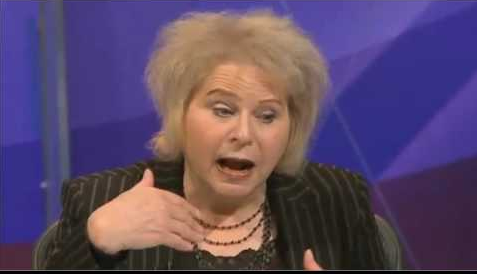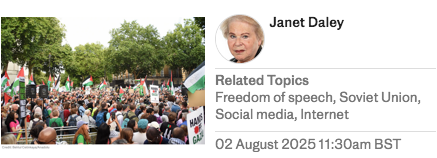We need to talk about Janet

TetleysTLDR: The summary
Janet Daley's latest Telegraph column masquerades as a defence of free speech, but it’s actually a dangerous exercise in misdirection. She falsely claims that Britain is sliding into Soviet-style repression due to modest attempts to regulate online hate speech. In truth, it's left-wing voices that face the brunt of state suppression, not the far-right provocateurs she pretends are under siege. Daley, once a Trotskyist herself, now uses her past cynically, employing Cold War caricatures to discredit anti-racists, climate activists, and trade unionists. Her claim that leftist protest movements are manipulated fronts is not just wrong; it’s dishonest, especially from someone who used to do exactly what she now condemns. The article also defends the status quo under the banner of 'liberty', conveniently ignoring that real threats to speech come from the right: anti-protest laws, surveillance of activists, and systemic crackdowns on dissent. Daley plays the victim while enjoying a national platform to demonise resistance and sanitise reactionary politics. More broadly, this kind of journalism enables fascist movements online. By casting any regulation as Orwellian tyranny, Daley arms the far right with talking points and legitimacy. She helps to mainstream hate while vilifying those who fight it.
The Telegraph has long served as a platform that panders to the far right, offering space to figures who openly flirt with xenophobia, culture war hysteria, and authoritarian nationalism. Its coverage and opinion pages routinely stoke fear of migrants, demonise progressive movements, and present multiculturalism as a threat. By amplifying these narratives under the guise of respectable conservatism, it provides a veneer of legitimacy to bigotry and fuels radicalisation. This isn’t journalism, it’s ideological warfare dressed up as editorial balance.
The real danger isn't censorship, it's a media ecosystem, including The Telegraph, that disguises authoritarianism as freedom and shields the powerful from accountability. In Orwell's words, they are "defending the indefensible."


Janet Daley's article in the Daily Telegraph: August 2nd 2025.
TetleysTLDR: The Article
Janet Daley is the poster girl for intellectual cowardice masquerading as contrarian brilliance: a former Marxist who sold her soul for a Telegraph column and a seat at the dinner parties of the reactionary elite. Once an academic voice with a whiff of promise, she now churns out sneering polemics for a dying class of empire apologists, wagging her finger at the working class she abandoned decades ago. Her trajectory from leftist academic to Thatcherite attack dog isn't evolution, it's betrayal. A woman who traded solidarity for spite, complexity for clickbait, and now spends her twilight years railing against 'woke culture' with the bitterness of someone whose relevance relies entirely on punching down.
Lets unpack Janet Daley’s 2 August 2025 Telegraph column which presents itself as a defence of free speech and civic liberty. In reality, it's a reactionary Trojan horse. It is a disingenuous, ideologically loaded polemic that misrepresents the stakes, misreads history, and provides cover for authoritarianism masquerading as liberalism.
1. False alarm on “Suppression”
Daley frames regulation of online hate, disinformation, and extremism as the end of free speech. She invokes the Cold War and Soviet repression as analogies for Britain’s attempts to regulate toxic online ecosystems. This comparison is historically absurd. The current efforts of democratic governments to address harmful disinformation and online radicalisation are not about censoring legitimate political speech; they are about safeguarding public order and vulnerable communities.[1]
Unlike Soviet regimes, these actions are subject to judicial oversight, legislative debate, and public scrutiny. More to the point, it is the left, not the right, that is consistently targeted by the British state. From the mass surveillance of environmental groups[2] to the proscription of non-violent protest movements like Palestine Action[3] the trend is clear: state power is wielded far more aggressively against those who challenge the political and economic status quo than against those who defend it.
Legislation such as the Public Order Act 2023 disproportionately affects leftist movements and trade unions, not reactionary commentators or right-wing culture warriors. To claim, as Daley does, that freedom of speech is under threat because far-right voices face criticism or moderation is the worst kind of faux victimhood, something she excels at. The real threat is not to free expression but to those who challenge state violence, systemic racism, and corporate power. Their speech is surveilled, criminalised, and repressed. That Daley can write a nationally syndicated column claiming to be silenced is the very definition of privilege masquerading as persecution. Daley conflates consequences with censorship. As civil rights scholar Nadine Strossen puts it, "Free speech does not mean speech free of consequences."[4] In a liberal democracy, the state has a duty to intervene when speech incites violence or undermines public safety, even though the state quite often does it clumsily.
2. Misrepresentation of activists
Daley paints anti-racist and environmental protesters as pawns of shadowy Trotskyist cadres, regurgitating long-debunked myths from the Cold War. Her caricature of the Socialist Workers Party as puppet masters of protest movements ignores the broad, decentralised nature of modern activism and says more about the hard left in her day than now. Movements like Stand Up To Racism, the Palestine rights movement and Just Stop Oil are often localised, grassroots efforts involving trade unionists, students, and community organisers.[5]
The irony, of course, is that in her youth, Janet Daley was more far left than most of those she now accuses of Marxist subversion. A committed Trotskyist during her time with the International Socialists, Daley knows perfectly well how the activist left organises, because she was once part of it. But that was then not now and the world has moved on. Communism is over. Rather than being a poacher turned gamekeeper as she tries to. frame herself as, she has become a neoliberal polemicist who cynically recycles Trotskyist tropes to discredit legitimate criticism of the state. Her personal history makes her accusations all the more dishonest. This demonisation of protesters serves a clear ideological purpose: to delegitimise resistance. By implying these actions are inauthentic or externally orchestrated, Daley denies working-class people their agency while smearing dissent as subversion.
3. Weaponising liberty for authoritarianism
Daley uses the language of freedom to defend the status quo of impunity. She claims public speech is being 'policed out of existence' by a moral elite, ignoring the reality that far-right hate speech and conspiracy theories continue to flourish online, often with deadly consequences. From the Christchurch mosque shooter to the Buffalo supermarket massacre, white supremacist violence has been explicitly fuelled by online ecosystems where this 'free speech' ran rampant.[6]
Her column omits that the UK's recent anti-protest laws, such as the Police, Crime, Sentencing and Courts Act 2022, that have severely limited the right to dissent, are not from the left, but by a right-wing state apparatus cheered on by papers like The Telegraph.[7]
Daley defends a selective freedom: for corporations, reactionaries, and billionaires, not for migrants, trade unionists, or the poor.
4. The Telegraph as instigator, not investigator
Of course her position comes as no surprise. The Telegraph has spent decades laundering hard-right ideology through the language of patriotism and traditional values. It rails against censorship but remains silent when protesters are arrested for holding blank placards or calling for a ceasefire in Gaza. It champions liberty while promoting xenophobic immigration policies and mass surveillance. The paper regularly provides a platform for figures like Nigel Farage, Suella Braverman, and Douglas Murray, whose writings echo the conspiracist language of the 'great replacement' theory or vilify multiculturalism.[8] This is not a neutral or balanced publication; it is a cultural weapon for Britain’s ruling class, dressed in broadsheet clothing.
5. How reactionary journalism enables internet fascism
Daley’s arguments do not exist in a vacuum. They are part of a broader discursive ecosystem that emboldens the far right online. By presenting hate speech regulation as Orwellian overreach, her column gives fascists a rhetorical shield. When liberal democracies hesitate to regulate digital hate, fascists exploit the vacuum. Research shows that online radicalisation often begins with exposure to mainstream right-wing talking points, which then escalate into extremism.[9] YouTube's algorithm, Facebook groups, and Twitter/X echo chambers all serve as incubators. Figures like Ben Shapiro, Jordan Peterson, and Andrew Tate act as gateway influencers. The 'respectable' press, through articles like Daley's, helps these figures claim legitimacy by echoing their grievances. By repeating the line that 'wokeness' is a greater threat than fascism, Daley normalises far-right narratives. As journalist Jason Stanley notes, fascist movements thrive when liberal institutions are delegitimised and when elites lend their voices to populist grievance.[10]
6. Why it matters, and why it’s dangerous
When establishment columnists present all regulation as illiberal, they erase distinctions between democracy and fascism. They conflate accountability with censorship and manufacture consent for inaction in the face of violence. In doing so, they make liberal societies more vulnerable to exactly the kind of authoritarianism they pretend to oppose. The danger isn't that Britain is over-regulating speech. It's that publications like The Telegraph are actively undermining public understanding of what freedom really means. They are, to borrow from George Orwell, 'defending the indefensible'.
Footnotes
[1] Department for Digital, Culture, Media & Sport. (2023). Online Safety Act: Fact Sheet. Retrieved from https://www.gov.uk/government/publications/online-safety-bill-factsheet
[2] Evans, R. (2019). "Spycops: How the state infiltrated the climate movement." The Guardian. Retrieved from https://www.theguardian.com
[3] Dodd, V. (2025). "Palestine Action Proscribed Under Terrorism Legislation." The Guardian. Retrieved from https://www.theguardian.com
[4] Strossen, N. (2018). Hate: Why We Should Resist It With Free Speech, Not Censorship. Oxford University Press.
[5] Stand Up To Racism. (2024). "Our Campaigns." Retrieved from https://standuptoracism.org.uk
[6] Frenkel, S., & Isaac, M. (2022). "How White Supremacists Infiltrated Facebook." The New York Times. Retrieved from https://www.nytimes.com
[7] Liberty. (2022). Protest Under Threat: The Police, Crime, Sentencing and Courts Act. Retrieved from https://www.libertyhumanrights.org.uk
[8] The Guardian. (2023). "Braverman's 'Multiculturalism Has Failed' Speech Echoes Far-Right Talking Points." Retrieved from https://www.theguardian.com
[9] Davey, J., & Ebner, J. (2019). The Mainstreaming of Far-Right Extremism Online and How to Counter It. Institute for Strategic Dialogue.
[10] Stanley, J. (2018). How Fascism Works: The Politics of Us and Them. Random House.
A bit of shameless self-plugging here. This is www.TetleysTLDR.com blog. It's not monetised. Please feel feel to go and look at the previous ones on the website and if you like them, please feel free to share them.

